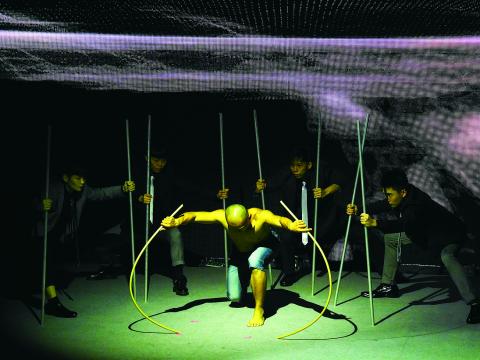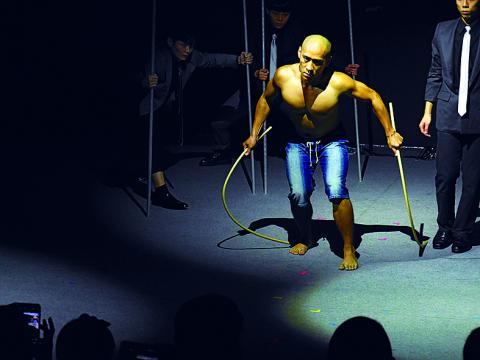Almost eight years ago, I had the chance to interview two young members of the Zen-drumming group U-Theatre (優劇場) at a rather unusual location: Taichung Prison, where they were performing.
Unusual for me, yes, but not for A-gan (阿甘) and Hsiao-tsai (小蔡) — they used nicknames at the time — because they had been inmates at Changhua Prison.
They were graduates of the Guwu Percussion Troupe (鼓舞打擊樂團), which U-Theatre founder and artistic director Liu Ruo-yu (劉若瑀) had begun in August 2009 as part of the Changhua facility’s unique traditional arts program, and true to her promise to Guwu members, Liu had hired them upon their release.

Photo Courtesy of U-Theater
It was not an easy fit for either young man, as U-Theatre is renowned for its ascetic training regime and lifestyle, with company members living near the troupe’s base on Laoquanshan (老泉山) in Taipei’s Muzha (木柵) District. But both saw the company as a chance to turn their lives around — although A-gan took a lot more convincing.
In the eight years since that interview, A-gan has stayed with the company, gradually becoming a mainstay of the team, performing around Taiwan and on several foreign tours. Hsiao-tsai has retired from performing due to an old knee injury.
This weekend A-gan is starring in a show inspired by his life at the theater that is part of the company’s “downtown” office space, Sulja’s War (蘇拉心戰), under his full Mandarin name, Chung Chen-yang (鍾鎮陽).

Photo Courtesy of U-Theater
The Paiwan from a broken family in central Taiwan excelled in boxing in elementary school, but got into so many fights as a teenager that he ended up behind bars at age 15, serving a five-year sentence for seriously injuring another young man, identified only by his surname, Chu (朱).
A few years after A-gan was released from prison, he was able to get in contact with Chu, apologize to him and pay him compensation. Chu eventually forgave him and has even become a fan of A-gan and the company.
Sulja’s War, directed by Liu, with music by Huang Chih-chun (黃誌群), tells the story of a young Paiwan boy who embarks on a fantastic journey to prove himself to his people. He encounters a variety of creatures, good and bad, along the way that share their stories with him and help him face the contradictions and struggles in his own life.
In the program notes, A-gan said he wanted to tackle questions such as how can a person who loses everything face himself, and is it possible for a convict to change themselves.
With Sulja’s War, he has finally been able to tell the story that he has carried in his heart for so many years, he said.

This year will go down in the history books. Taiwan faces enormous turmoil and uncertainty in the coming months. Which political parties are in a good position to handle big changes? All of the main parties are beset with challenges. Taking stock, this column examined the Taiwan People’s Party (TPP) (“Huang Kuo-chang’s choking the life out of the TPP,” May 28, page 12), the Democratic Progressive Party (DPP) (“Challenges amid choppy waters for the DPP,” June 14, page 12) and the Chinese Nationalist Party (KMT) (“KMT struggles to seize opportunities as ‘interesting times’ loom,” June 20, page 11). Times like these can

June 23 to June 29 After capturing the walled city of Hsinchu on June 22, 1895, the Japanese hoped to quickly push south and seize control of Taiwan’s entire west coast — but their advance was stalled for more than a month. Not only did local Hakka fighters continue to cause them headaches, resistance forces even attempted to retake the city three times. “We had planned to occupy Anping (Tainan) and Takao (Kaohsiung) as soon as possible, but ever since we took Hsinchu, nearby bandits proclaiming to be ‘righteous people’ (義民) have been destroying train tracks and electrical cables, and gathering in villages

Dr. Y. Tony Yang, Associate Dean of Health Policy and Population Science at George Washington University, argued last week in a piece for the Taipei Times about former president Ma Ying-jeou (馬英九) leading a student delegation to the People’s Republic of China (PRC) that, “The real question is not whether Ma’s visit helps or hurts Taiwan — it is why Taiwan lacks a sophisticated, multi-track approach to one of the most complex geopolitical relationships in the world” (“Ma’s Visit, DPP’s Blind Spot,” June 18, page 8). Yang contends that the Democratic Progressive Party (DPP) has a blind spot: “By treating any

Swooping low over the banks of a Nile River tributary, an aid flight run by retired American military officers released a stream of food-stuffed sacks over a town emptied by fighting in South Sudan, a country wracked by conflict. Last week’s air drop was the latest in a controversial development — private contracting firms led by former US intelligence officers and military veterans delivering aid to some of the world’s deadliest conflict zones, in operations organized with governments that are combatants in the conflicts. The moves are roiling the global aid community, which warns of a more militarized, politicized and profit-seeking trend